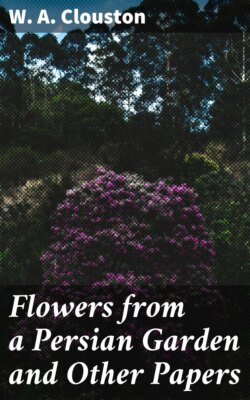Читать книгу Flowers from a Persian Garden and Other Papers - W. A. Clouston - Страница 8
На сайте Литреса книга снята с продажи.
ОглавлениеAnd this our life, exempt from public haunts,
Finds tongues in trees, books in the running brooks,
Sermons in stones, and good in everything.23
Saádí had thus expressed the same sentiment before him: “The foliage of a newly-clothed tree, to the eye of a discerning man, displays a whole volume of the wondrous works of the Creator.” Another Persian poet, Jámí, in his beautiful mystical poem of Yúsuf wa Zulaykhá, says: “Every leaf is a tongue uttering praises, like one who keepeth crying, ‘In the name of God.’ ”24 And the Afghan poet Abdu ’r-Rahman says: “Every tree, every shrub, stands ready to bend before him; every herb and blade of grass is a tongue to mutter his praises.” And Horace Smith, that most pleasing but unpretentious writer, both of verse and prose, has thus finely amplified the idea of “tongues in trees”:
Your voiceless lips, O Flowers, are living preachers,
Each cup a pulpit, every leaf a book,
Supplying to my fancy numerous teachers,
From loneliest nook.
’Neath cloistered boughs, each floral bell that swingeth,
And tolls its perfume on the passing air,
Makes Sabbath in the fields, and ever ringeth
A call to prayer;—
Not to the domes where crumbling arch and column
Attest the feebleness of mortal hand,
But to that fane, most catholic and solemn,
Which God hath planned:
To that cathedral, boundless as our wonder,
Whose quenchless lamps the sun and moon supply;
Its choir, the winds and waves, its organ, thunder,
Its dome, the sky.
There, amid solitude and shade, I wander
Through the green aisles, and, stretched upon the sod,
Awed by the silence, reverently ponder
The ways of God.
When Saádí composed his Gulistán, in 1278, he was between eighty and ninety years of age, with his great mind still vigorous as ever; and he lived many years after, beloved and revered by the poor, whose necessities he relieved, and honoured and esteemed by the noble and the learned, who frequently visited the venerable solitary, to gather and treasure up the pearls of wisdom which dropped from his eloquent tongue. Like other poets of lofty genius, he possessed a firm assurance of the immortality of his fame. “A rose,” says he, “may continue to bloom for five or six days, but this Rose-Garden will flourish for ever”; and again: “These verses and recitals of mine will endure after every particle of my dust has been dispersed.” Six centuries have passed away since the gifted sage penned his Gulistán, and his fame has not only continued in his own land and throughout the East generally, but has spread into all European countries, and across the Atlantic, where long after the days of Saádí “still stood the forests primeval.”
